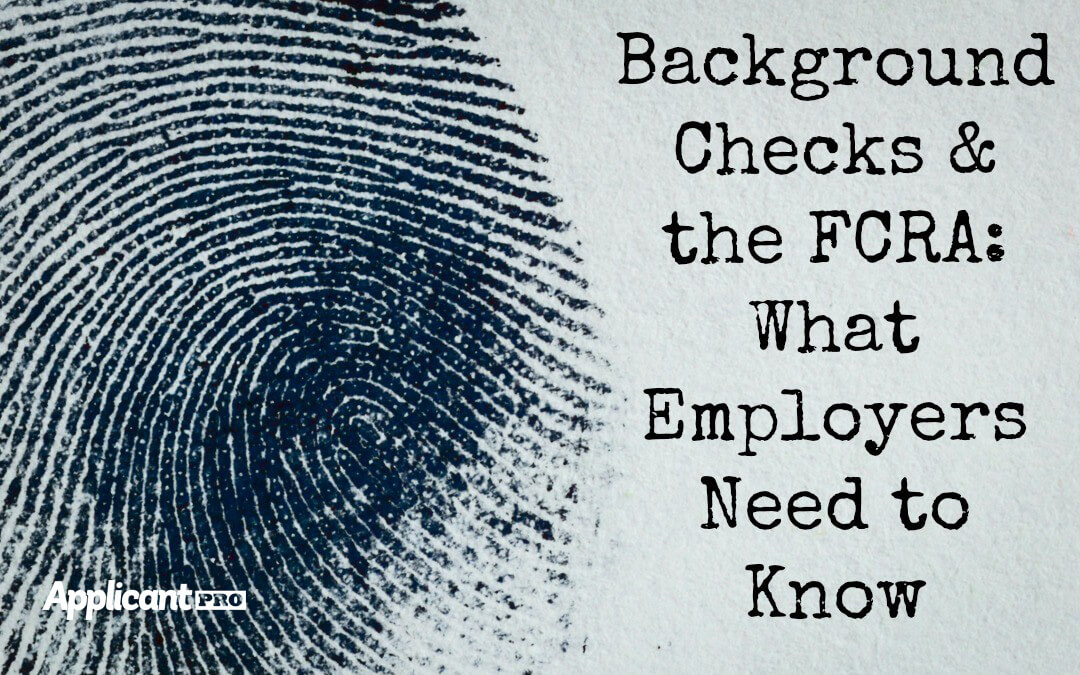
Background Checks and the FCRA: What Employers Need to Know
Originally enacted in 1970, the Fair Credit Reporting Act (FCRA) is a federal law that regulates the collection, dissemination and use of consumer information. While the name of the law may infer that regulations apply only to the procurement and use of credit reports, it’s important to note that the FCRA regulates consumer reports and investigative consumer reports, otherwise known as background checks, prepared by background check companies.
The purpose of this article is to highlight specific areas of the FCRA that are critical for users of background check reports to remain in compliance with FCRA regulations.
Lawsuits targeting employers for failing to comply with provisions in the FCRA are on the rise.
Lawsuits targeting employers for failing to comply with provisions in the FCRA are on the rise. Large companies such as Dollar General, Whole Foods, Panera, and Michaels have been the subjects of class action lawsuits for allegedly violating certain parts of the FCRA. The sharp increase in lawsuits largely revolve around three key areas:
- Failure to provide a disclosure to an applicant before a background check is ordered
- “Extraneous” information in a background check disclosure
- Failure to comply with the FCRA adverse action requirements
So what can employers protect themselves from a potential lawsuit? Below are key pieces of the FCRA that every employer utilizing background checks should be following.
Find the Right Hiring Software
Our Hiring Software Buyer's Guide provides a real-world hiring software essentials checklist that will help you make an informed decision.
Before Ordering a Background Check Report
The FCRA requires employers to provide a “clear and conspicuous” disclosure in writing to the applicant. The “disclosure” must explain that a Consumer Report and/or Investigative Consumer Report may be procured for employment purposes. The disclosure must also include the background check agency’s name, address, and telephone number, describe the nature and scope of the background check reports to be ordered, and meet all other requirements specified by applicable law.
The FCRA further states that the disclosure shall “stand alone,” meaning that the disclosure must not be combined with or stapled to any employment application or other document. The disclosure must also not contain any extraneous information. The most common extraneous information inserted into a background check disclosure is a release of liability. As mentioned above, the extraneous language in background check disclosure notifications has been the source of many new lawsuits.
While the FCRA is a federal law, some states may have additional disclosure requirements for background check disclosures. We recommend checking with an employment law attorney in your state to ensure compliance with any state required disclosures.
Employers must then obtain authorization in writing, or by electronic means from the applicant prior to obtaining the background check report.
Adverse Action Requirements
The adverse action requirements are a critical piece of the FCRA and provide the applicant with an opportunity to review and dispute (if necessary) any inaccurate or erroneous information in a background check report. Adverse action is generally described as action to deny an applicant employment based on information contained in an applicant’s background check. Considering an applicant for a position other than the position he/she originally applied for “based in whole or in part” on a background check report may also be considered adverse action.
The adverse action requirements are a critical piece of the FCRA.
Before taking adverse action based “in whole or in part” on a background check, an employer must provide the applicant with a copy of the background check and a copy of “A Summary of Your Rights Under the Fair Credit Reporting Act.” The employer is then required to allow a “reasonable period of time” to pass to allow the applicant to identify any possible errors or inaccuracies in the report. While the FCRA does not provide a specific amount of time, the general consensus is that 3-5 business days is appropriate.
After taking adverse action, the employer must provide the applicant with the name, address and telephone number of the background check agency that prepared the report and a statement that the agency “did not make the decision to take the adverse action and is unable to provide the applicant with the specific reasons why the adverse action was taken.” Furthermore, the employer must provide notice to the applicant of the applicant’s right to obtain a free copy of the background check report from the background check agency within 60 days of the notice, and their right to dispute the accuracy or completeness of any information in the report.
If you have any further questions about the items mentioned in this article, or if you would like ApplicantPro to assist you in building a compliant background check program, please contact us.
Legal Disclaimer: This article is designed solely for informational purposes, and should not be inferred or understood as legal advice. Persons in need of legal assistance should seek the advice of competent legal counsel.

Hiring Software Buyer's Guide
This guide provides key hiring statistics and thought starters about hiring effectively and how it impacts your company's bottom line.
Share this article
Related Articles

Introducing ApplicantPro's New AI Features!
Introducing ApplicantPro's New AI Features! Streamline your hiring process with Candidate Matching and Job Ad AI Pro. Say goodbye to manual sorting and hello to top talent!

Get the story a resume can't tell you by using video interviews!
Are you struggling to manage a flood of resumes and limited time for in-person interviews? You might need Automated Video Interviews! This powerful tool lets candidates complete interviews on their own time, providing flexibility for both parties.

ApplicantPro Payroll Can Help Your New Hires Enroll In Benefits
We have a solution for enrolling new hires in your company benefits and health care programs! ApplicantPro Payroll Benefits Administration offers a seamless, self-service benefits enrollment process, empowering employees to choose and enroll in personalized plans.